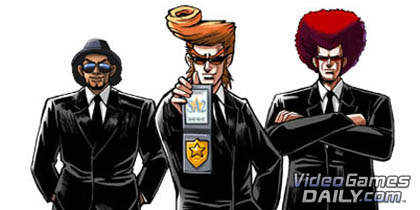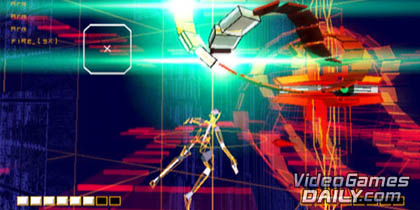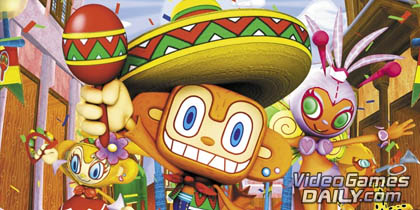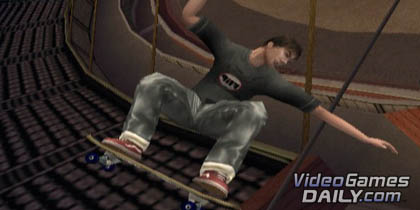
![]()
Ouendan/Elite Beat Agents
2005-2007

Life can be pretty tough sometimes but it’s distinctly less so when you have a trio of male cheerleaders giving you a boost when your spirits are flagging, or at least that’s what the Ouendan games have taught me. The great thing about the three games in this recent series is that they steadily evolve the core mechanic while updating the track list in a way that feels right. The two Ouendan outings, released only in Japan, steer clear of western-style songs found in Elite Beat Agents for the most part but provide zanier stories to accompany the infectious tap-and-drag-to-the-beat mechanic. What I appreciated most was how I knew that failure was my own fault. And with level after level of increasing difficulty, there’s a lot of learning – and failure – to be had.
Further Reading: Review
![]()
Rez
2002

Five minutes in a darkened room with the volume way higher than it should be is all you need to convince yourself that Tetsuya Mizuguchi’s music shooter is among the best games of this or any decade. Building chains and losing yourself in the thumping electronic soundtrack satisfies your senses and numbs you to the few flaws the games does have, as you delve deeper and deeper into your electronic host en route to the core. More and more people argue that games need to be recognized as art, and with games such as Rez around, making the argument is that much easier.
Further Reading: Video Interview
![]()
Samba De Amigo
2000

For sheer, unblemished fun, it doesn’t get much better than Samba De Amigo. From the vibrant art to the rattle of the sturdy maraca controllers, Sega’s gorgeous arcade cabinet oozes joy, inviting you to relieve yourself of your inhibitions for a few minutes and give yourself over to the infectious songs in the eclectic soundtrack that includes obvious Latin American songs from the likes of Ricky Martin, a sprinkling of pop-punk tracks and everything in between. With arcades nearly a thing of the past, the best you’ll be able to do now is the Dreamcast release or last year’s Wii follow-up.
![]()
Tony Hawk Pro Skater 2
2000

Looking at this year’s Tony Hawk Ride it’s easy to forget what amazing games this series used to produce. The first took over my life and had my avoiding social engagements in order to play more but it was the arrival of the second game in the series that really showed how fun virtual skateboarding could be. The introduction of the manual, such a small thing, completely altered the game and turned it into the quest for the biggest combo. So why this particular one? Simple. Neversoft was still keeping the experience relatively close to reality (and I use the term relatively loosely) and it was before the more-hardcore-than-thou story segments in the Underground games started getting rammed down our throats. The visuals in this have not aged well but even now it is worth going back to see just how much of a leap forward this game was.






 Satoru Iwata Video Interview - the late Nintendo president spoke with Kikizo in 2004 as 'Nintendo Revolution' loomed.
Satoru Iwata Video Interview - the late Nintendo president spoke with Kikizo in 2004 as 'Nintendo Revolution' loomed. Kaz Hirai Video Interview - the first of Kikizo's interviews with the man who went on to become global head of Sony.
Kaz Hirai Video Interview - the first of Kikizo's interviews with the man who went on to become global head of Sony. Ed Fries Video Interview - one of Xbox's founders discusses an epic journey from Excel to Xbox.
Ed Fries Video Interview - one of Xbox's founders discusses an epic journey from Excel to Xbox. Yu Suzuki, the Kikizo Interview - we spend time with one of gaming's most revered creators.
Yu Suzuki, the Kikizo Interview - we spend time with one of gaming's most revered creators. Tetris - The Making of an Icon: Alexey Pajitnov and Henk Rogers reveal the fascinating story behind Tetris
Tetris - The Making of an Icon: Alexey Pajitnov and Henk Rogers reveal the fascinating story behind Tetris Rare founders, Chris and Tim Stamper - their only interview? Genuinely 'rare' sit down with founders of the legendary studio.
Rare founders, Chris and Tim Stamper - their only interview? Genuinely 'rare' sit down with founders of the legendary studio. The History of First-Person Shooters - a retrospective, from Maze War to Modern Warfare
The History of First-Person Shooters - a retrospective, from Maze War to Modern Warfare